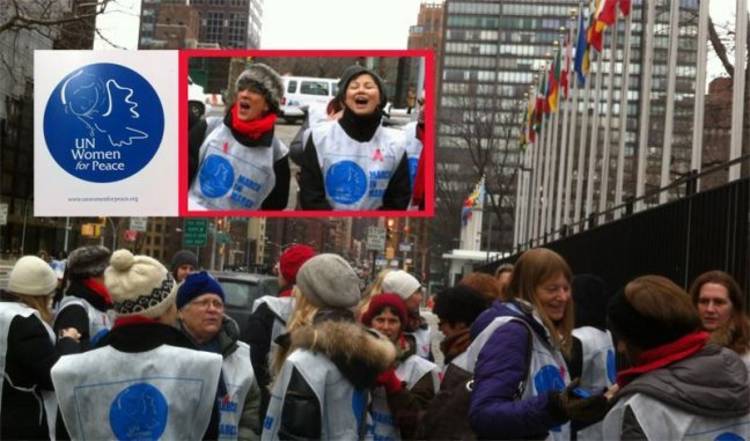


New York, United Nations. Women, young ladies, and girls all wearing a white coverup, set to make history as they have been every year now, since 2008. Women of all ages and from many nations, almost like flags waving in front of the glass building, paying their respect.
Personalities such as Ban Soon-Taek [2], Nassir Al Nasser [3], Rosemary Di Carlo [4], Muna Rihani Al Nasser [5], Lakshmi Puri [6], Dr. Allan E.Goodman [7], Trudie Styler [8] to name a few, alongside many other women, all gathered sharing the same goal: to march in order to end gender violence. The initiative comes from UN WOMEN FOR PEACE [9], an organization of the United Nations established back in 2008 under the patronage of Ban Soon-Taek.
The organization aims to support humanitarian programs favoring women in emerging countries and countries of active conflicts. Gender equality is in fact still a goal to be achieved in developing countries, where even the most basic rights, like the right to live, often are denied.
The data collected by the United Nations is unfortunately much too clear. In some countries, seven out of ten women are victims of abuse, rape and even mutilation. There is mention of more than 100 million women who have undergone the barbaric practice of infibulation and every year more than three million African women are likely to be subjected to such brutality. And these are just the numbers that come to us, because violence against women is often hidden and insinuated. It enters homes and too often remains inside of them.
We present a short but an important way, and although here we focus on underdeveloped countries, but we shed a light on what continues to happen even in the homes of the so-called developed countries where women still suffer from domestic violence. So lets not think that some societies are immune to this.
But lets get back to the developing countries for which the gathered data appears puzzling and light years away from our reality, yet is the norm there, thanks especially to the lack of education even at the most basic level. It is a fact that more than 77 million girls cannot even attend elementary school.
This data may make people understand immediately, how extremely vulnerable are those who are soon to become the women of tomorrow.
Education is indeed one of the key points of the program of UN WOMEN FOR PEACE, which through a project called University for Peace offers scholarships to disadvantaged women to study at the University for Peace in Costa Rica where education and growth are considered to be the fundamental basis for reducing violence and prejudice.
On this day, we highlight the need to achieve gender equality as not "just" a matter of justice and violation of fundamental human rights, but also because progress of many other sectors depends on it.
Countries with the greater gender equality are often those that enjoy greater economic growth, companies led by female leaders seem to usually have better performance. Women all over the world, and of all social groups use most of their salaries for the welfare of their family. Reducing women's poverty thus means to reducing poverty globally.
This is one of the key points on which the UN WOMEN FOR PEACE plans to work in order to make tangible, the hopes of equality of many, many women. Muna Rihani Al-Nasser, Deidre Imus [10], Sheikha Paula al-Sabah [11], Cindy McCain [12] just discussed this over lunch at the headquarters of the United Nations, which took place before the march.
First of all work for a woman is important. Working or perhaps owning a business, is not only important on the profit level, but also leads to a higher awareness of the role that women can play in society, and more generally for economy itself.
The project Goldman Sachs 10,000 [13], established thanks to the great contribution of Dina Habib Powell, [14] president of the Goldman Sachs Foundation, is doing just that. It is a program that provides education on a managerial level, and helps, even financially, women in developing countries to open their own businesses.
The day "March in March To End the Violence Against Women" thus goes beyond simple awareness of gender violence and sets clear goals to conquer it with concrete projects. Similarly in fact to the UN TRUST FUND TO END VIOLENCE AGAINST WOMEN [15] which since 1996, provides aid and services for women subjected to violence and abuse, and deals with the implementation of laws and policies to combat gender-based violence.
Violence against women cannot and should not be considered only a cultural issue, but also a serious criminal offense. It is important also to march along with the people in the streets. Especially on the occasion of the celebration of March 8th, which over the years seems to be losing its authentic spirit. It is important in a society like ours blinded by money, where International Women's Day seems to have become just a consumeristic phenomenon that leads some men to give flowers and maybe to a dinner between friends, strictly women.
Source URL: http://test.casaitaliananyu.org/magazine/focus/facts-stories/article/new-york-united-nations-women-march-against-gender-violence
Links
[1] http://test.casaitaliananyu.org/files/unwomen1394477308jpg
[2] http://www.huffingtonpost.com/mrs-ban-soontaek/every-woman-every-child_b_3216408.html
[3] http://en.wikipedia.org/wiki/Nassir_Abdulaziz_Al-Nasser
[4] http://en.wikipedia.org/wiki/Rosemary_DiCarlo
[5] http://www.huffingtonpost.com/muna-rihani-alnasser/
[6] http://en.wikipedia.org/wiki/Lakshmi_Puri
[7] http://www.iie.org/Who-We-Are/Governance/Executive-Staff/Dr-Allan-Goodman
[8] http://en.wikipedia.org/wiki/Trudie_Styler
[9] http://unwomenforpeace.org/
[10] http://en.wikipedia.org/wiki/Deirdre_Imus
[11] http://en.wikipedia.org/wiki/House_of_Sabah
[12] http://en.wikipedia.org/wiki/Cindy_McCain
[13] http://www.goldmansachs.com/citizenship/10000women/
[14] http://en.wikipedia.org/wiki/Dina_Powell
[15] http://www.unwomen.org/en/trust-funds/un-trust-fund-to-end-violence-against-women